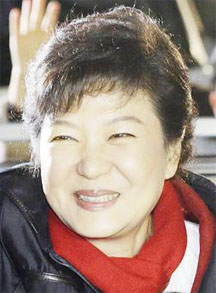SEOUL, (Reuters) – South Korea’s first woman president, Park Geun-hye, will have her job cut out when she takes office in February with the economy slowing, her father’s autocratic rule still an issue for many and North Korea as unpredictable as ever.
Park, 60, won yesterday’s hotly contested election comfortably. She replaces fellow conservative Lee Myung-bak after his mandatory single, five-year term ended.
The slightly built and elegant Park grew up in Seoul’s presidential palace during the 18-year rule of her father, Park Chung-hee, who took power in a military coup in 1961.
Park is likely to face protests by South Korea’s vocal left, angry over the rise to power of the daughter of a man they believe was a repressive “dictator”.
“This will be a tremendous burden on her ability to govern,” said political commentator Yu Chang-seon of Park’s heritage.
“It effectively means that she could be in direct conflict with half of society … The first six months will be key.”

On the economy, which dominated the election campaign, Park has promised more social welfare but given few specifics.
Korea has achieved astonishing success in rising from the ashes of the 1950-53 Korean War to become the world’s 14th largest economy, but rewards have been thinly spread.
Economic growth was 5.5 percent for decades, driven by some of the world’s biggest companies, such as Samsung Electronics Co Ltd and Hyundai Motor Co. That pace has slowed and this year the economy will expand by about 2 percent.
The hundreds of thousands of graduates that South Korean universities churn out each year complain they have trouble finding decent jobs and income differentials have widened sharply. Park’s party says it will not spend more money to boost the economy.
LEGACY
Park has at times invoked her father’s legacy of rapid growth that propelled South Korea into the league of industrialised nations.
At other times, she has apologised for his suppression of protests and the execution of people suspected of sympathising with the North, which is still technically at war with the South after an armistice ended the Korean War.
Families of those who were executed under her father’s rule believe Park has not apologised enough and that she has sought to sweep her past under the carpet. Park was her father’s “First Lady” following the assassination in 1974 of her mother up until the former ruler’s own shooting in 1979.
The most notorious executions under Park’s rule were of eight men aged 30 to 52 who were dubbed the “People’s Revolutionary Party”. They were hanged 24 hours after being sentenced for treason, leaving scant time for review.
The eight represented a broad section of South Korean society, comprising a bee keeper, a brewery owner, an acupuncurist and teachers. They were exonerated posthumously by the Supreme Court in 2007.
“What she needs to be doing is to reach out to everyone, to those who oppose her, to show her interest and offer her sympathy and to say that she feels sorry for what happened,” said Reverend Park Jung-il, who was the chief army chaplain in April 1975 and witnessed the dawn executions of the eight men.
As well as confronting a domestic legacy that is still painful for many South Koreans, Park will have to deal with Kim Jong-un, the 29-year-old ruler of North Korea whose grandfather ordered several assassination attempts on her father.
In 2002, during a thaw in relations, Park met Kim Jong-il, the father of the latest Kim to rule the isolated state that in 2010 sank a South Korean naval vessel and shelled a South Korean island.
When she met him, Park declared the man who later propelled North Korea to become what it calls a “nuclear weapons power” to be someone “who would keep his word”.





